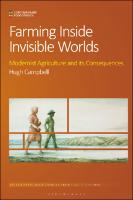Farming Inside Invisible Worlds
Modernist Agriculture and its Consequences
Abstract
This book is available as open access through the Bloomsbury Open Access programme and is available on www.bloomsburycollections.com. It is funded by the University of Otago, New Zealand. Farming Inside Invisible Worlds argues that the farm is a key player in the creation and stabilisation of political, economic and ecological power-particularly in colonised landscapes like New Zealand, America and Australia. This open access book reviews and rejects the way that farms are characterised in orthodox economics and agricultural science and then shows how re-centring the farm using the theoretical idea of political ontology can transform the way we understand the power of farming. Starting with the colonial history of farms in New Zealand, Hugh Campbell goes on to describe the rise of modernist farming and its often hidden political, racial and ecological effects. He concludes with an examination of alternative ways to farm in New Zealand, showing how the prior histories of colonisation and modernisation reveal important ways to farm differently in post-colonial worlds. Hugh Campbell's book has wide-ranging implications for understanding the role farms play in both our food systems and landscapes, and is an exciting new addition to food studies.
Keywords
Cultural studies: food and society; Rural communitiesDOI
10.5040/9781350120570ISBN
9781350120563, 9781350120556, 9781350120563Publisher
Bloomsbury AcademicPublisher website
https://www.bloomsbury.com/academic/Publication date and place
London, 2020Imprint
Bloomsbury AcademicSeries
Contemporary Food Studies: Economy, Culture and Politics,Classification
Cultural studies: food and society
Manufacturing industries


 Download
Download